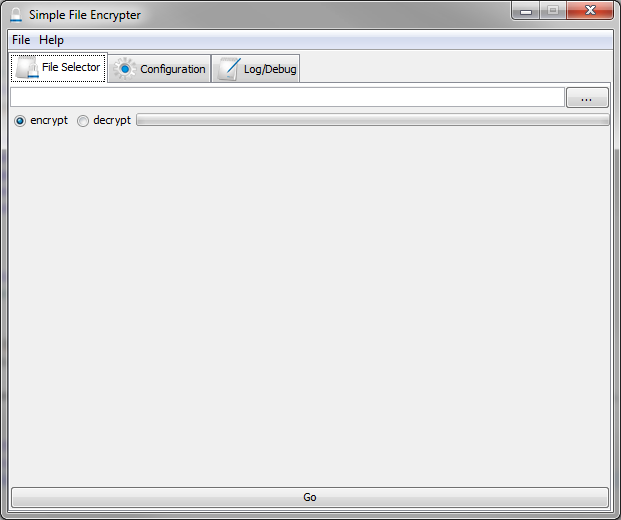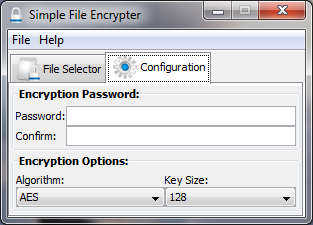Simple File Encrypter version 0.3b is done. Tested on Windows, OS X, Linux, and Solaris.
http://projects.cryptofreek.org/SimpleFileEncrypter/


Simple File Encrypter version 0.3b is done. Tested on Windows, OS X, Linux, and Solaris.
http://projects.cryptofreek.org/SimpleFileEncrypter/


I’m working on a little app that can do simple and portable file encryption across different operating systems. Something I can put on a thumb drive to encrypt files so that when I inevitably loose the drive, all my documents aren’t public knowledge.
Most modern operating systems offer file encryption … a lot of new external drives and flash drives come with programs that will encrypt the filesystem … but all of those things are a huge pain when you live on multiple platforms. I move files around between my Windows, Mac, and Solaris computers at work and my Linux boxes at home. I need something simple to get the job done that works on all of the above. Java lets me do this pretty easily, let’s take a look …
Cryptography is still a bit of a black art, even when looking at high level API’s like we’ll see in this example. There are any number of different ways to do this using different types of keys and algorithms. In this example, I’ll be using a simple password based symmetric key with Triple DES (DESede) encryption (PKCS #5, RFC2898). Please see the RFC doc for a definition of terminology.
The first step is generating an encryption key and using it to create a cipher:
public static Cipher createCipher( char[] password,
int nMode,
byte[] baSalt,
int nInterations ) throws NoSuchAlgorithmException,
InvalidKeySpecException,
InvalidKeyException,
InvalidAlgorithmParameterException,
NoSuchPaddingException
{
Cipher cipher = null;
PBEParameterSpec pbeParamSpec = new PBEParameterSpec( baSalt, nInterations );
PBEKeySpec pbeKeySpec = new PBEKeySpec( password );
SecretKeyFactory keyFac = SecretKeyFactory.getInstance( "PBEWithSHA1AndDESede" );
SecretKey key = keyFac.generateSecret( pbeKeySpec );
cipher = Cipher.getInstance( "PBEWithSHA1AndDESede" );
cipher.init( nMode, key, pbeParamSpec );
return cipher;
}
Once the cipher is created, the crypto operation is as easy as reading and writing to IO streams. These could be any streams you could think of, but in this case we are using file streams:
public static void doCrypto( InputStream in, OutputStream out, Cipher cipher ) throws IOException
{
CipherOutputStream cos = new CipherOutputStream( out, cipher );
byte[] baChunck = new byte[1024];
for( int nRead = 0; nRead >= 0; nRead = in.read( baChunck ) )
{
cos.write( baChunck, 0, nRead );
}
in.close();
out.close();
cos.close();
}
That’s it, here’s a full working example:
import java.io.File;
import java.io.FileInputStream;
import java.io.FileNotFoundException;
import java.io.FileOutputStream;
import java.io.IOException;
import java.io.InputStream;
import java.io.OutputStream;
import java.security.InvalidAlgorithmParameterException;
import java.security.InvalidKeyException;
import java.security.NoSuchAlgorithmException;
import java.security.spec.InvalidKeySpecException;
import javax.crypto.Cipher;
import javax.crypto.CipherOutputStream;
import javax.crypto.NoSuchPaddingException;
import javax.crypto.SecretKey;
import javax.crypto.SecretKeyFactory;
import javax.crypto.spec.PBEKeySpec;
import javax.crypto.spec.PBEParameterSpec;
public class CCryptoUtils
{
public static Cipher createCipher( char[] password,
int nMode,
byte[] baSalt,
int nInterations ) throws NoSuchAlgorithmException,
InvalidKeySpecException,
InvalidKeyException,
InvalidAlgorithmParameterException,
NoSuchPaddingException
{
Cipher cipher = null;
PBEParameterSpec pbeParamSpec = new PBEParameterSpec( baSalt, nInterations );
PBEKeySpec pbeKeySpec = new PBEKeySpec( password );
SecretKeyFactory keyFac = SecretKeyFactory.getInstance( "PBEWithSHA1AndDESede" );
SecretKey key = keyFac.generateSecret( pbeKeySpec );
cipher = Cipher.getInstance( "PBEWithSHA1AndDESede" );
cipher.init( nMode, key, pbeParamSpec );
return cipher;
}
public static void doCrypto( InputStream in, OutputStream out, Cipher cipher ) throws IOException
{
CipherOutputStream cos = new CipherOutputStream( out, cipher );
byte[] baChunck = new byte[128];
for( int nRead = 0; nRead >= 0; nRead = in.read( baChunck ) )
{
cos.write( baChunck, 0, nRead );
}
in.close();
cos.close();
}
public static void doFileOperation( File fileIn,
File fileOut,
int nMode,
char[] password,
byte[] baSalt,
int nIterations ) throws InvalidKeyException,
NoSuchAlgorithmException,
InvalidKeySpecException,
InvalidAlgorithmParameterException,
NoSuchPaddingException,
FileNotFoundException,
IOException
{
Cipher cipher = createCipher( password, nMode, baSalt, nIterations );
doCrypto( new FileInputStream( fileIn ),
new FileOutputStream( fileOut ),
cipher );
}
public static void main( String[] args )
{
char[] password = "mypassword".toCharArray();
byte[] baSalt = "'~7&03~/.".getBytes();
int nIterations = 1;
File fileToEncrypt = new File( "/Users/cryptofreek/Desktop/test.txt" );
File fileEncrypted = new File( "/Users/cryptofreek/Desktop/test.txt.encrypted" );
File fileDecrypted = new File( "/Users/cryptofreek/Desktop/test.txt.decrypted" );
try
{
doFileOperation( fileToEncrypt,
fileEncrypted,
Cipher.ENCRYPT_MODE,
password,
baSalt,
nIterations );
doFileOperation( fileEncrypted,
fileDecrypted,
Cipher.DECRYPT_MODE,
password,
baSalt,
nIterations );
}
catch( Exception e )
{
e.printStackTrace();
}
}
}
Update: The real beauty of using IO streams like this is that you do not have to worry as much about Java’s heap space. Your memory usage rarely grows past the chunk size specified in the “doCrypto()” function; even if you are operating on huge files.